

Scottish American. Scottish Americans or Scots Americans (Scottish Gaelic: Ameireaganaich Albannach) are Americans whose ancestry originates wholly or partly in Scotland.
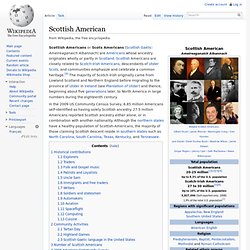
Scottish Americans are closely related to Scotch-Irish Americans, descendants of Ulster Scots, and communities emphasize and celebrate a common heritage.[9] The majority of Scotch-Irish originally came from Lowland Scotland and Northern England before migrating to the province of Ulster in Ireland (see Plantation of Ulster) and thence, beginning about five generations later, to North America in large numbers during the eighteenth century.
In the 2009 US Community Census Survey, 6.85 million Americans self-identified as having solely Scottish ancestry. 27.5 million Americans reported Scottish ancestry either alone, or in combination with another nationality. Historical contributions[edit] Explorers[edit] Historic Rural Hill. History of the Scots and Scots-Irish Great Scots Tartan Day: A Day of Scottish Pride Clans: A Brief History Genealogical Resources and Research The Scottish Cook: Recipies of the People “Human beings are the product and embodiment of their own past.
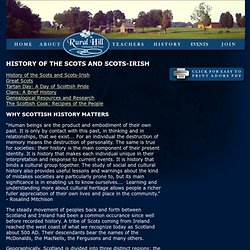
It is only by contact with this past, in thinking and in relationships, that we exist…. CEPPA. Scots thinkers who forged new democracy from the colonies John Haldane In an age in which abstract political ideas and ideals have been submerged by politics and political commentary, we have become used to thinking of the US President simply as a politician, identifying the office with its passing and party-aligned occupant.
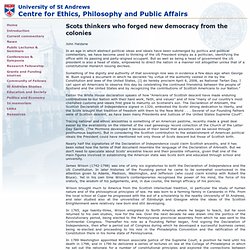
But as well as being a head of government the US president is also a head of state, empowered to direct the nation in a manner not altogether unlike that of a constitutional monarch issuing decrees. The Scottish influence on the US Declaration of Independence, from Arbroath to the Enlightenment. Portrait of Professor William Small by Tilly Kettle.
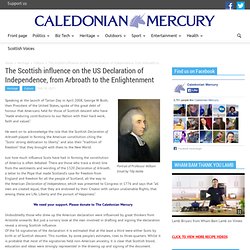
US presidents of Scottish descent. Thomas Jefferson (1743-1826) THE third president of the United States and a founding father, Jefferson wrote the Declaration of Independence.
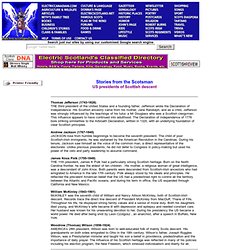
His Scottish ancestry came from his mother, Jane Randolph, and as a child, Jefferson was strongly influenced by the teachings of his tutor, a Mr Douglass who was a Scottish clergyman. This influence appears to have continued into adulthood. The Declaration of Independence of 1776 bore striking similarities to the Arbroath Declaration, written in 1320, with an underlying foundation of clear Scottish principles. Andrew Jackson (1767-1845) JACKSON rose from humble beginnings to become the seventh president. How many of the United States presidents were of Scottish descent or have Scottish ancestry. List of Scottish Americans. This is a list of notable Scottish Americans, including both original immigrants who obtained American citizenship and their American descendants.
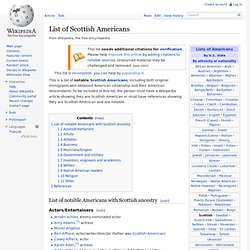
To be included in this list, the person must have a Wikipedia article showing they are Scottish American or must have references showing they are Scottish American and are notable. List of notable Americans with Scottish ancestry[edit] Actors/Entertainers[edit] Artists[edit] Athletes[edit] Business[edit] Musicians/Singers[edit] Government and military[edit] Thomas Jefferson. Thomas Jefferson (April 13 [O.S.
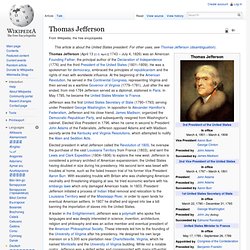
James Monroe. Andrew Jackson. Jackson was nicknamed Old Hickory because of his toughness and aggressive personality; he fought in duels, some fatal to his opponents.[2] He was a wealthy slaveholder.
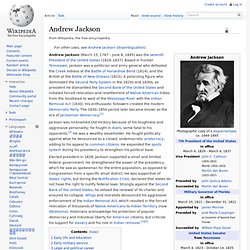
He fought politically against what he denounced as a closed, undemocratic aristocracy, adding to his appeal to common citizens. He expanded the spoils system during his presidency to strengthen his political base. Early life and education Jackson was born on March 15, 1767. James K. Polk. Polk was the last strong pre–Civil War president, and he is the earliest of whom there are surviving photographs taken during a term in office.
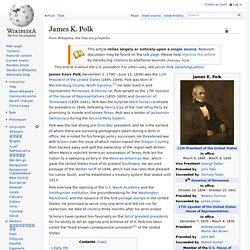
He is noted for his foreign policy successes. He threatened war with Britain over the issue of which nation owned the Oregon Country, then backed away and split the ownership of the region with Britain. When Mexico rejected American annexation of Texas, Polk led the nation to a sweeping victory in the Mexican-American War, which gave the United States most of its present Southwest. He secured passage of the Walker tariff of 1846, which had low rates that pleased his native South, and he established a treasury system that lasted until 1913. Polk oversaw the opening of the U.S. Scholars have ranked him favorably on the list of greatest presidents for his ability to set an agenda and achieve all of it.
Early life Polk was home schooled.[5] His health was problematic and in 1812 his pain became so unbearable that he was taken to Dr. James K. Millard Fillmore. As an anti-slavery moderate, he opposed abolitionist demands to exclude slavery from all of the territory gained in the Mexican War.
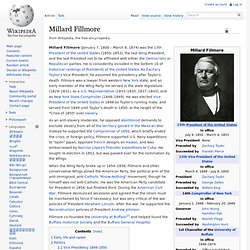
Instead he supported the Compromise of 1850, which briefly ended the crisis. In foreign policy, Fillmore supported U.S. Navy expeditions to "open" Japan, opposed French designs on Hawaii, and was embarrassed by Narciso López's filibuster expeditions to Cuba. James Buchanan. Buchanan statue in National Portrait Gallery James Buchanan, Jr. (/bjuːˈkænən/; April 23, 1791 – June 1, 1868) was the 15th President of the United States (1857–1861), serving immediately prior to the American Civil War. He is, to date, the only president from Pennsylvania and the only president to remain a lifelong bachelor. He represented Pennsylvania in the United States House of Representatives and later the Senate and served as Minister to Russia under President Andrew Jackson. He was also Secretary of State under President James K. Andrew Johnson. Johnson was born in poverty in Raleigh, North Carolina.
Apprenticed as a tailor, he worked in several frontier towns before settling in Greeneville, Tennessee. He served as alderman and mayor there before being elected to the Tennessee House of Representatives in 1835. After brief service in the Tennessee Senate, Johnson was elected to the federal House of Representatives in 1843, where he served five two-year terms. He became Governor of Tennessee for four years, and was elected by the legislature to the Senate in 1857. Ulysses S. Grant. Ulysses S. Grant (born Hiram Ulysses Grant; April 27, 1822 – July 23, 1885) was the 18th president of the United States (1869–1877) following his success as military commander in the American Civil War. Under Grant, the Union Army defeated the Confederate military; the war, and secession, ended with the surrender of Robert E. Lee's army at Appomattox Court House. Rutherford B. Hayes. Rutherford Birchard Hayes (October 4, 1822 – January 17, 1893) was the 19th President of the United States (1877–1881).
As president, he oversaw the end of Reconstruction, began the efforts that led to civil service reform, and attempted to reconcile the divisions left over from the Civil War and Reconstruction. Hayes believed in meritocratic government, equal treatment without regard to race, and improvement through education.
Chester A. Arthur. Grover Cleveland. William McKinley. Theodore Roosevelt. William Howard Taft. Woodrow Wilson. In his first term as President, Wilson persuaded a Democratic Congress to pass a legislative agenda that few presidents have equaled, remaining unmatched up until the New Deal in 1933.[2] This agenda included the Federal Reserve Act, Federal Trade Commission Act, the Clayton Antitrust Act, the Federal Farm Loan Act and an income tax.
Warren G. Harding. Harry S. Truman. Lyndon B. Johnson. Richard Nixon. Nixon was born in Yorba Linda, California. He graduated from Whittier College in 1934 and Duke University School of Law in 1937, returning to California to practice law. Ronald Reagan. George W. Bush. Barack Obama. Barack Hussein Obama II (